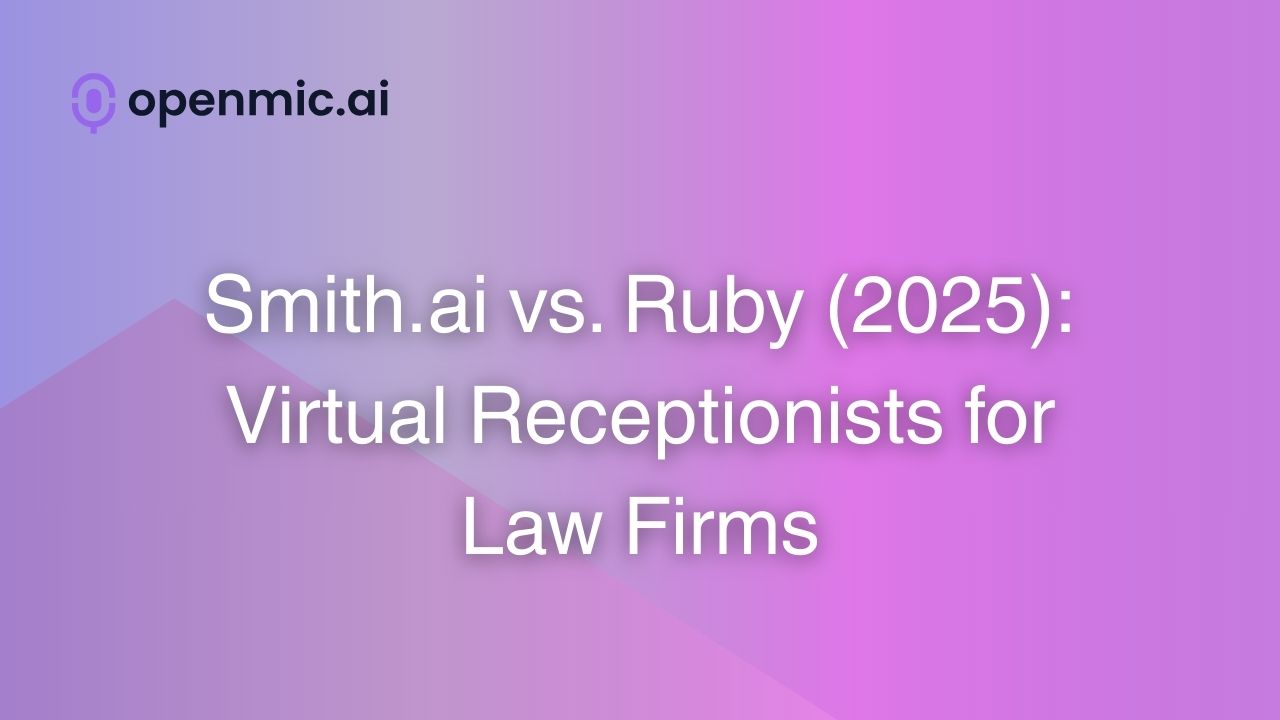
Smith.ai vs. Ruby (2025): Virtual Receptionists for Law Firms
Your firm’s phone rings after hours. A nervous caller needs help now. If no one answers, they call the next firm, and that missed intake could cost thousands. That’s why answering services for lawyers matter.
The virtual receptionist service market is experiencing explosive growth, projected to reach $3.2 billion by 2033 with a compound annual growth rate of 9.2%. Two names often lead the conversation: Ruby (human-only receptionists) and Smith.ai (AI + human hybrid). Below, we compare how each serves law firms.
This blog walks you through the decision whether to stay with the incumbent or adopt an agile, AI-driven option.
Smith.ai:
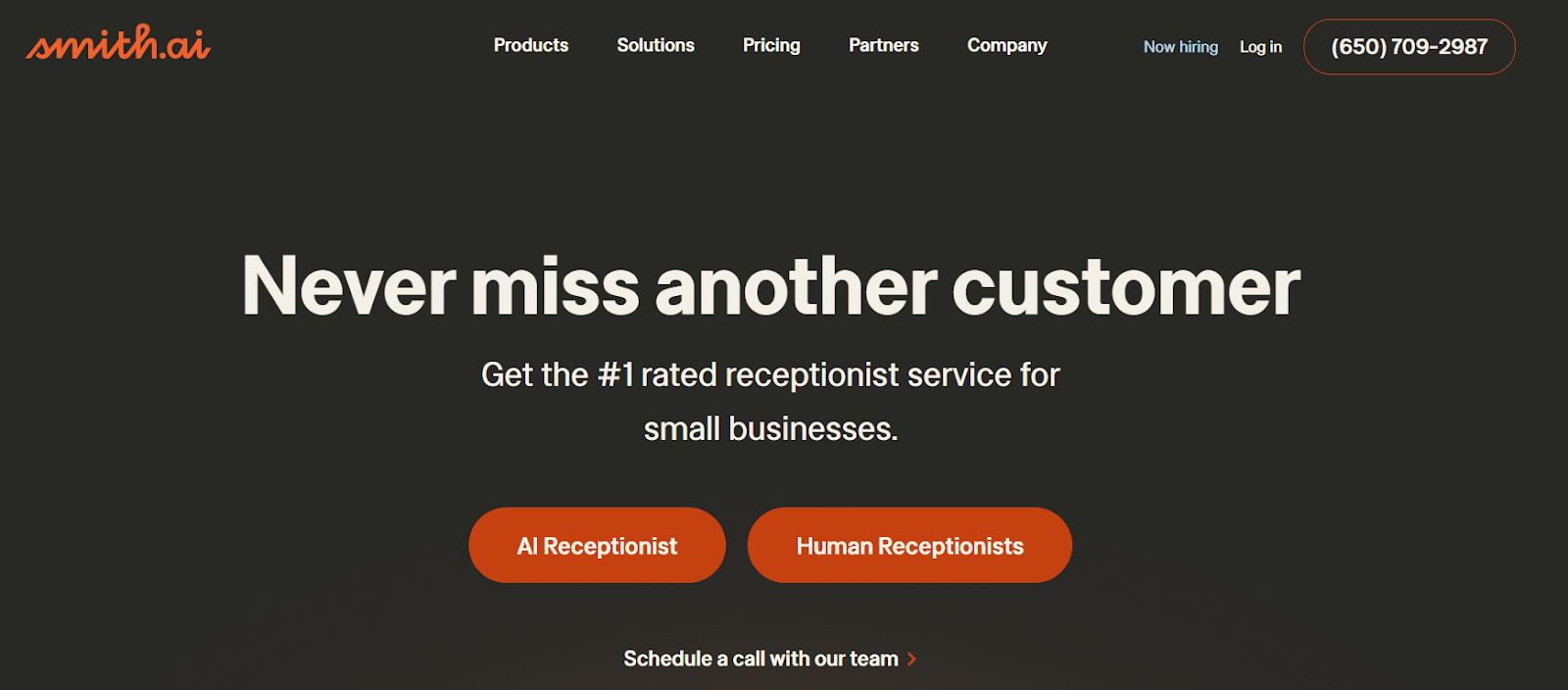
Smith.ai delivers a mix of human-powered and AI-driven virtual receptionist services, along with outreach campaigns and AI-enabled web chat for multiple industries, especially law firms. Its offers cover lead qualification, client intake, appointment scheduling, and payment collection. The platform uses advanced AI to route calls, record and transcribe conversations, track caller history, identify locations by zip code, and enhance receptionist productivity. It integrates smoothly with leading calendaring tools, CRMs, and automation platforms. The starter plan begins at $292.50/month for 30 calls with virtual receptionists, and $97.50/month for 30 calls handled by AI receptionists. For live-staffed chat, the starter plan includes 20 chats at $140/month.
Ruby:
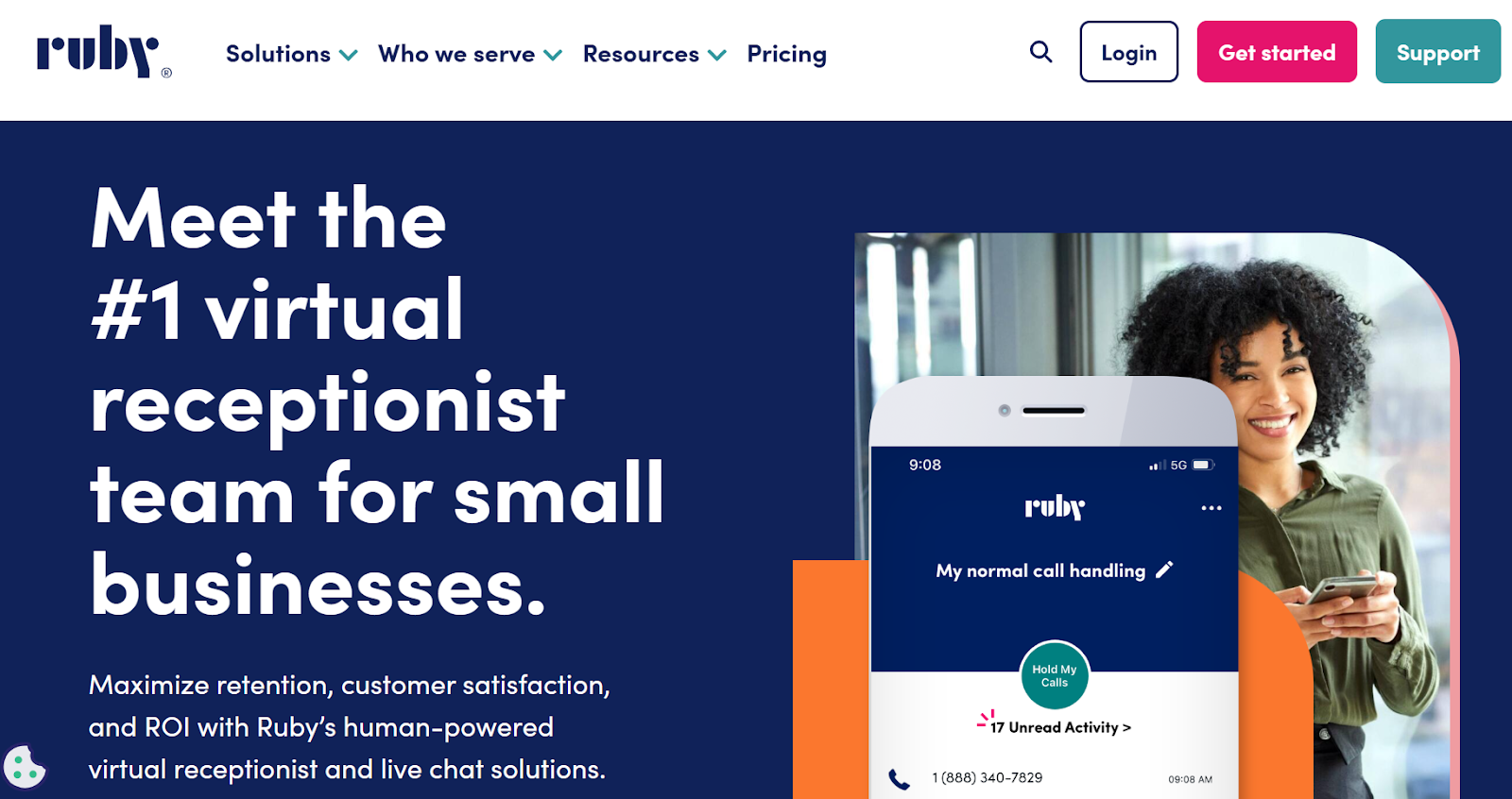
Ruby offers live, human-powered virtual receptionist support designed for small businesses. Their team handles 24/7 phone answering, call transfers, scheduling, payment processing, client intake, and lead capture. Ruby also provides live website chat to engage and convert online visitors. The service is trusted across industries such as legal, home services, healthcare, financial, and business services. Each year, Ruby helps capture more than 1.6 million leads and manages over 1.1 million conversations every month. It connects with popular platforms like Zapier, MyCase, and Rocket Matter for easy integration. Pricing starts at $245/month for 50 receptionist minutes and $135/month for up to 10 live chats.
Smith.ai vs Ruby Features Comparison
1. AI Receptionist vs Human Receptionist
Smith.ai: For law firms, both speed and accuracy are critical. Smith.ai blends AI technology with live receptionists to deliver that balance. Its AI screens calls, blocks spam, and instantly captures important client details. Routine questions like office hours or directions are answered immediately by AI. A live receptionist steps in when a caller requires deep intake. This combination of automation and human empathy helps law firms to provide client-focused conversations.
Ruby: Each call is answered by a live, U.S.-based receptionist without AI participation. This direct human connection can quickly build confidence for law firms that handle sensitive cases such as personal injuries, family law, or criminal defense.
The Decision: Ultimately, the contrast between Smith.ai and Ruby highlights the central choice for law firms today. Either choose a hybrid AI-plus-human model or stay with a fully human approach for a more traditional and personal touch.
2. Live Chat Services
Smith.ai: AI + Human Hybrid approach transforms live chats for law firms. The plans start at $140/month for 20 chats. AI Chatbot learns directly from the content of your website to provide accurate, law firm-specific answers. This mix of automation and human support makes Smith.ai one of the most modern and cost-effective live chat options available to law firms.
Ruby: The live Chat Service depends entirely on 100% human agents, with 10 chats starting at $140/month. Their chat specialists focus on capturing website leads, customizing chat box design, and assisting with appointment scheduling.
The Decision: When it comes to live chat, the choice is clear: Smith.ai offers twice the chat volume at the same price, powered by an efficient AI + human hybrid model. Ruby, on the other hand, focuses on human-only service, a good fit for firms that want every interaction handled by a live person, even if it comes at a higher cost per chat.
3. Smith.ai vs Ruby Pricing Comparison:
Smith.ai: It uses a per-call or per-chat pricing model, which makes costs flexible and directly tied to your firm’s call or chat volume.
AI Receptionist
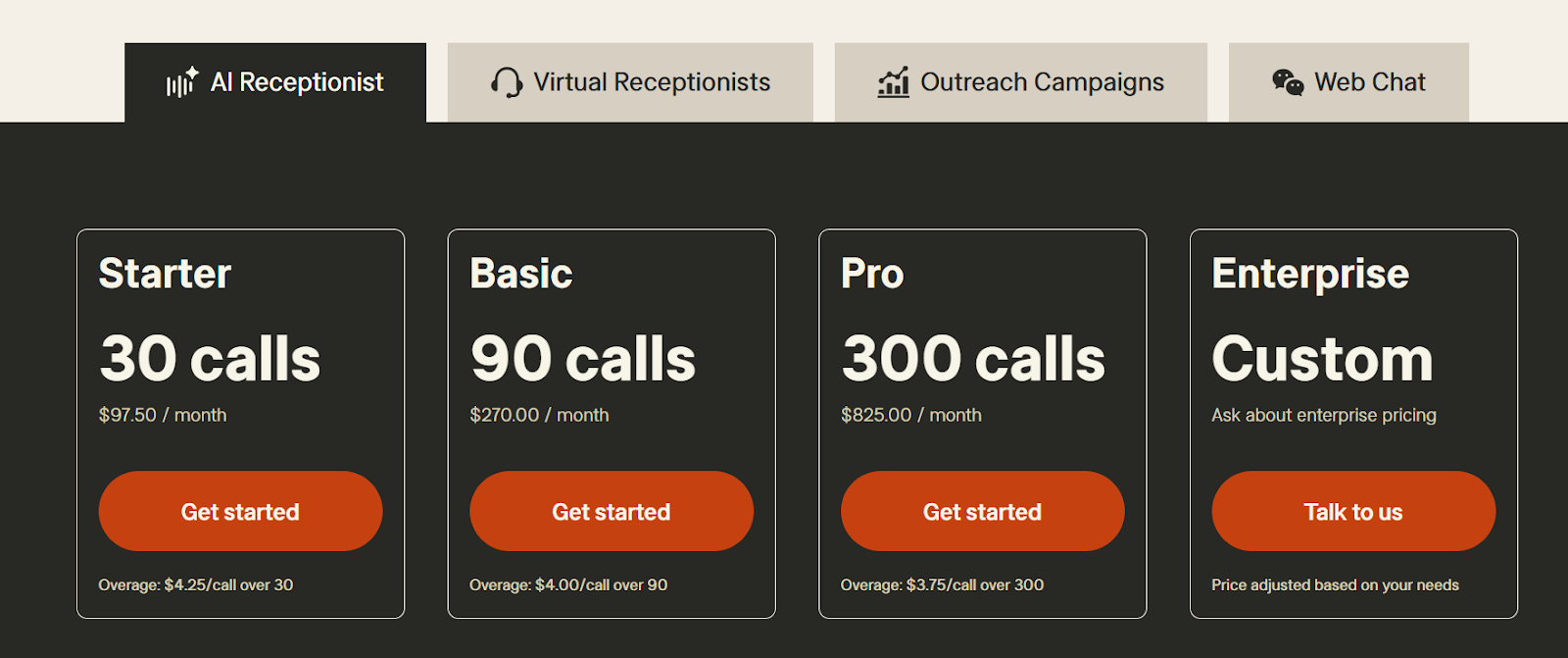
- Starter Plan: 30 calls for $97.50/month. Extra calls cost $4.25 each.
- Basic Plan: 90 calls for $270/month. Overage is $4.00 per call.
- Pro Plan: 300 calls for $825/month. Overage drops to $3.75 per call.
- Enterprise Plan: Custom pricing. It is built for high-volume needs.
Virtual Receptionist Pricing
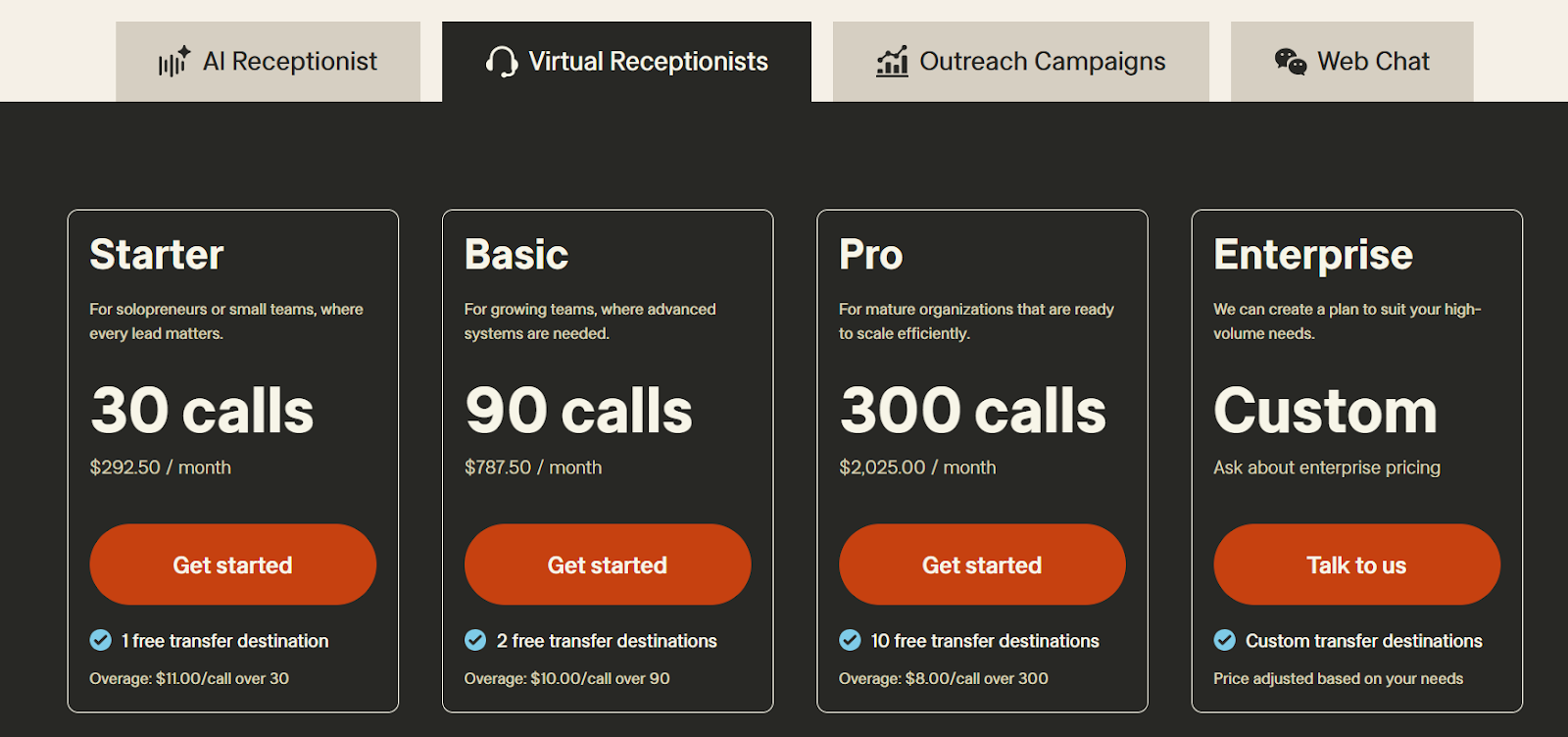
- Starter Plan: 30 calls for $292.50/month, includes 1 free transfer destination. Overage is $11 per call.
- Basic Plan: 90 calls for $787.50/month, includes 2 free transfer destinations. Overage is $10 per call.
- Pro Plan: 300 calls for $2,025/month, includes 10 free transfer destinations. Overage is $8 per call.
Web Chat
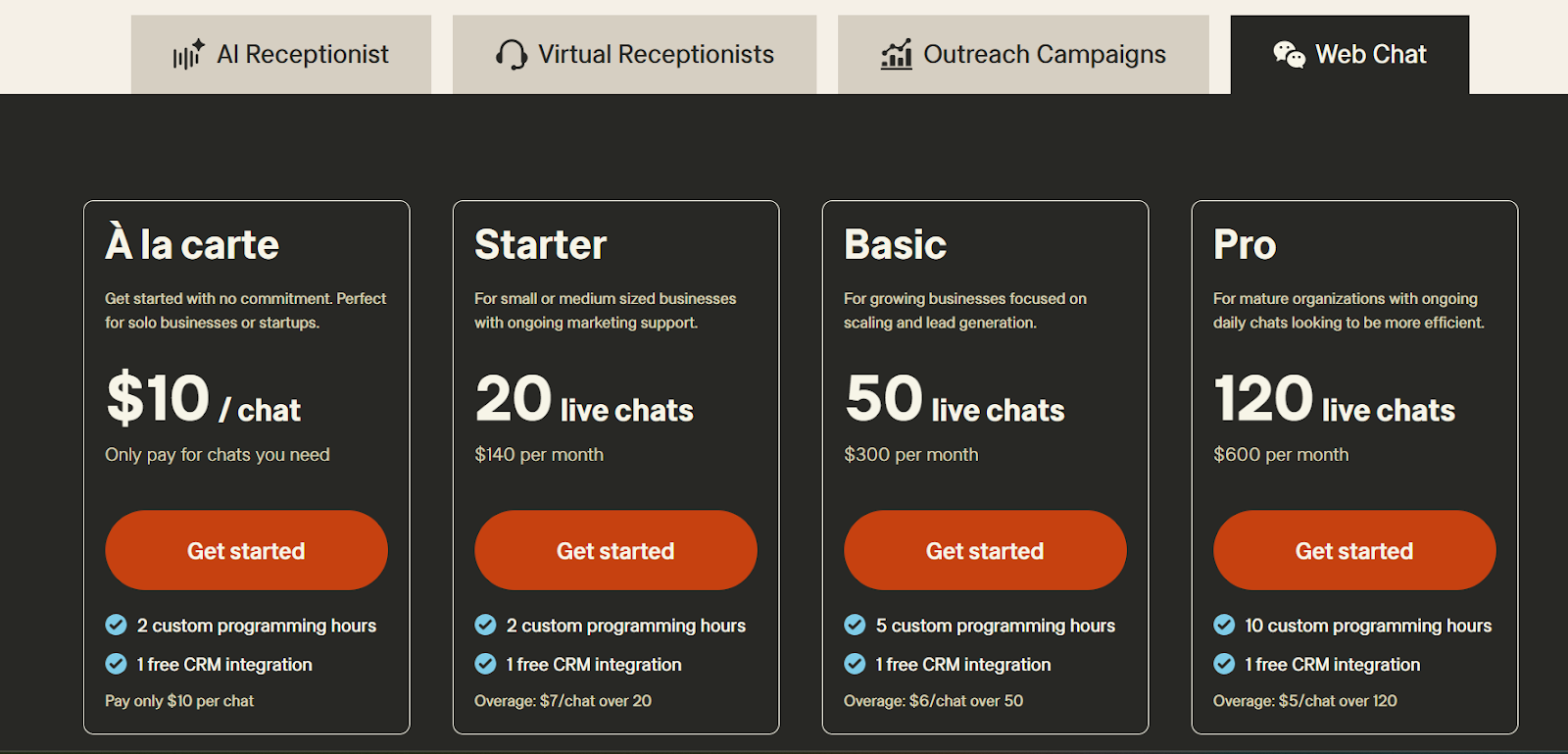
- À la carte: Pay-as-you-go at $10 per chat.
- Starter Plan: 20 live chats for $140/month. Overage is $7 per chat.
- Basic Plan: 50 live chats for $300/month. Overage is $6 per chat.
- Pro Plan: 120 live chats for $600/month. Overage is $5 per chat.
Ruby: It follows a flat monthly subscription model with live, U.S.-based receptionists answering every call. Firms pay for bundled talk time, and overages are billed per minute. Each pricing plan is based on talk time minutes.
Virtual Receptionist Pricing

- Starter Plan: $245/month for 50 minutes per month.
- Grow Plan: $385/month for 100 minutes per month.
- Elevate Plan: $705/month for 200 minutes per month.
- Pro Plan: $1,695/month for 500 minutes per month.
Live Chat
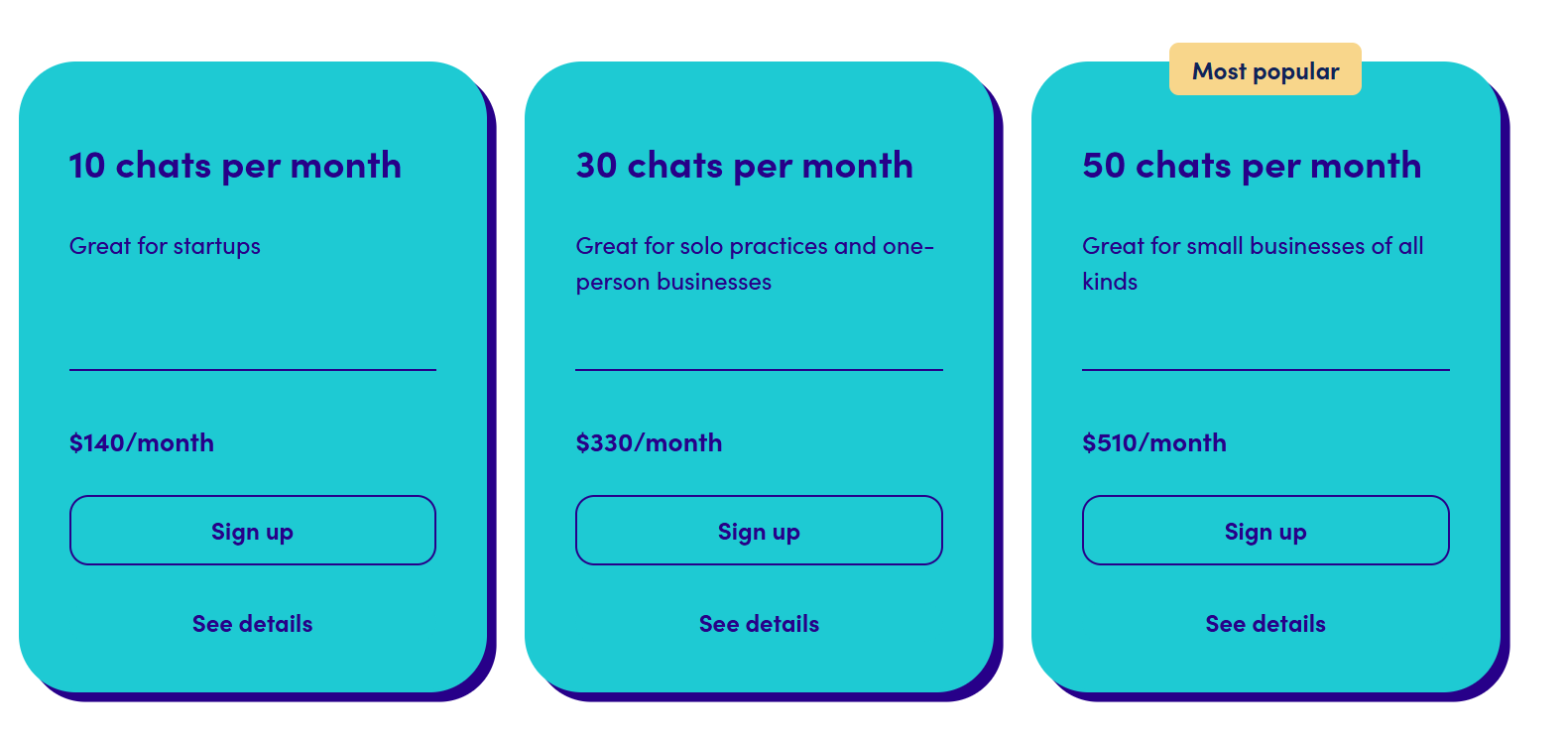
- 10 Chats per Month – $140/month. It is best for startups testing live chat for the first time.
- 30 Chats per Month – $330/month. It is designed for solo practices and one-person businesses.
- 50 Chats per Month – $510/month. A strong option for small businesses and growing law firms.
The Decision: Smith.ai offers flexible, volume-based pricing that lowers per-call and per-chat costs as usage grows. It is budget-friendly for small and large firms alike. Ruby uses flat monthly bundles with higher costs per minute or chat. For affordability and scalability, Smith.ai is the stronger pricing choice.
4. Integration Capabilities

Smith.ai: It integrates seamlessly with leading legal software such as Clio, Lawmatics, CASEpeer, Assembly Neos, Lawcus, and MyCase. These integrations do more than sync messages. They automatically create contacts, update case files, and manage appointment scheduling inside your practice management system. For example, the Law Ruler integration logs every call with summaries, lead qualification scores, and next-step recommendations.
Ruby: Ruby’s integrations are more limited. Its Clio connection syncs voicemails and call messages into Clio Manage, and its MyCase integration adds basic message syncing and appointment scheduling. However, beyond these, Ruby lacks advanced functionality. Firms often need to either give up parts of their tech stack or use costly Zapier workarounds to fill in gaps. This makes Ruby’s approach less adaptable for firms that rely on multiple legal tools to run their practice efficiently.
The Decision: On features, Smith.ai comes out ahead. Its deep, native integrations give law firms streamlined workflows and time-saving automation. However, Ruby remains restricted to basic syncing. For practices that want efficiency and scalability, Smith.ai is the better legal answering service.
5. Language Support
Smith.ai: It offers bilingual (English/Spanish) support through an AI-assisted + human model. Incoming calls can be identified and routed in the caller’s language, with bilingual agents handling intake, scheduling, and message relay.
Ruby: It provides a 100% human, bilingual (English/Spanish) answering service for law firms. Receptionists handle live answering, scheduling, warm transfers, and message relay. When a bilingual specialist is needed, a brief hold may occur during handoff.
The Decision: For bilingual support, Smith.ai wins on speed and efficiency with automatic language switching and AI-driven transcription. Ruby delivers a personal, human-only experience but may introduce small delays for Spanish-speaking callers.
5. Lead Management & Intake
Smith.ai: Excels in lead management, using AI-powered qualification systems that achieve conversion rates of up to 50% for law firms. Virtual receptionists complete full intake with custom questions, conflict checks, and bilingual support, while AI filters out spam and captures urgent client details. Integrations with tools like Clio, Lawmatics, and CASEpeer ensure every qualified lead flows directly into your case management system.
Ruby: It relies on human receptionists trained for legal intake. It captures lead information, schedules appointments, and syncs with tools like Clio, MyCase, and Rocket Matter. Ruby also offers outbound calling Monday–Friday, 6 am–5 pm PT, to confirm appointments and follow up with leads.
The Decision: For lead management, Smith.ai offers deeper automation, higher conversion potential, and broader integrations, making it ideal for growth-focused firms. Ruby provides a reliable human-first intake service but lacks the scalability and automation that technology-forward practices may need.
6. Law Firm Size
Smith.ai: It scales with firms of all sizes. Solos get affordable plans, intake scripts, and conflict checks. Medium firms benefit from CRM integrations, routing, and lead scoring. Large firms gain enterprise-grade features like unlimited call handling, multi-location support, and API integrations.
Ruby: It works best for small to mid-sized firms that value human-only receptionists. Larger practices may find it limiting, with no enterprise features, basic reporting, and restricted routing.
The Decision: Smith.ai fits every stage of growth, while Ruby suits smaller firms prioritizing personal interaction over scalability.
7. Compliance & Security Features
Smith.ai: It maintains HIPAA, GDPR, and SOC 2 Type II compliance with comprehensive security protocols, making it suitable for firms handling sensitive client data.
Ruby: It offers standard HIPAA compliance but provides limited transparency about its security infrastructure and certifications.
The Decision: Smith.ai leads with HIPAA, GDPR, and SOC 2 Type II compliance, making it more secure for sensitive client data. Ruby offers only basic HIPAA compliance with limited security transparency.
Smith.ai vs Ruby for Lawyers: Side-by-Side Comparison
The following table outlines a detailed virtual receptionist comparison between Smith.ai and Ruby, highlighting their pricing, features, integrations, compliance, and overall suitability for law firms.
The Next Evolution: AI Voice Agents
While Smith.ai and Ruby solved the "missed calls" problem, law firms in 2025 are demanding more sophisticated solutions. They need systems that can:
- Conduct intelligent legal intake: Not just take messages, but gather case details, perform conflict checks, and qualify prospects.
- Operate 24/7 without fatigue: Handle after-hours emergencies and weekend consultations.
- Scale instantly: Manage high-volume periods like mass tort campaigns without additional hiring
- Integrate deeply: Automatically create matters in practice management systems and trigger follow-up workflows.
This is where AI voice agents like OpenMic.ai represent the next generation of legal communication technology.
Choosing the Best Legal Answering Service for Lawyers
Pick the model that matches your volume, budget, and the balance you want between automation and human touch.
- Smith.ai is a strong fit if you want a hybrid AI-human receptionist with per-call pricing, built-in spam filtering, and broad CRM connectivity.
- Ruby makes sense if you need every call handled by a person, have very low call volume, and prefer a traditional provider with long-standing experience.
- If you’re building for scale, AI voice agents like OpenMic.ai offer 24/7 availability, consistent legal intake (not just message-taking), deep practice-management integrations, and predictable pricing without hiring constraints.
Conclusion
Smith.ai and Ruby, virtual receptionist comparison, offer strong solutions for law firms seeking a reliable answering service for lawyers. Ruby provides the reassurance of a 100% human receptionist model, while Smith.ai delivers innovation with its AI-human hybrid approach. Each has clear strengths: Ruby in personal touch and brand recognition, while Smith.ai in affordability and technology.
If you are looking for the best legal answering service for lawyers, skip missed calls, capture qualified intakes 24/7 with ultra-low latency voice and deep CRM integrations, then book a demo.
FAQs
What is the average cost of an answering service for lawyers?
Most legal answering services range between $250–$800 per month, depending on call volume, features, and whether you choose AI or human receptionists.
How much does Smith.ai cost vs Ruby?
Smith.ai starts at $285/month for 30 calls, around $9.50 per call, excluding spam and sales calls. Ruby starts at $245/month for 50 minutes, billed per minute of talk time.
What's the difference between AI and human receptionists?
AI receptionists provide 24/7 availability, speed, and lower costs, while human receptionists offer empathy, trust, and personal interaction. Many law firms prefer a hybrid model for balance.
What is the difference between a virtual assistant and an AI voice agent?
A virtual assistant usually helps in administrative features such as e -email and planning, while an AI Voice Agent is designed to respond to calls, capture client details, and handle real-time calls.
How do I choose an AI voice agent?
Look for one that offers low latency, strong integrations with your CRM, compliance features (like HIPAA or SOC 2), and natural-sounding voices to ensure smooth client conversations.
Explore related blogs
.png)
Voice AI for Mass Tort Lawyers: How Conversational AI Is Revolutionizing Case Intake & Client Engagement
.png)
Top 5 AI Answering Services for Law Firms in 2025 (24/7 Reception & Intake)
.png)
Top 5 White-Label Voice AI Platforms in 2025 (Best for Agencies & SaaS Providers)
Let AI Handle Your Phones So You Can Focus on Growth
Start your free trial and see how OpenMic’s AI voice agents can streamline calls, boost conversions, and deliver fast, 24/7 customer service — without hiring more staff.






.svg)